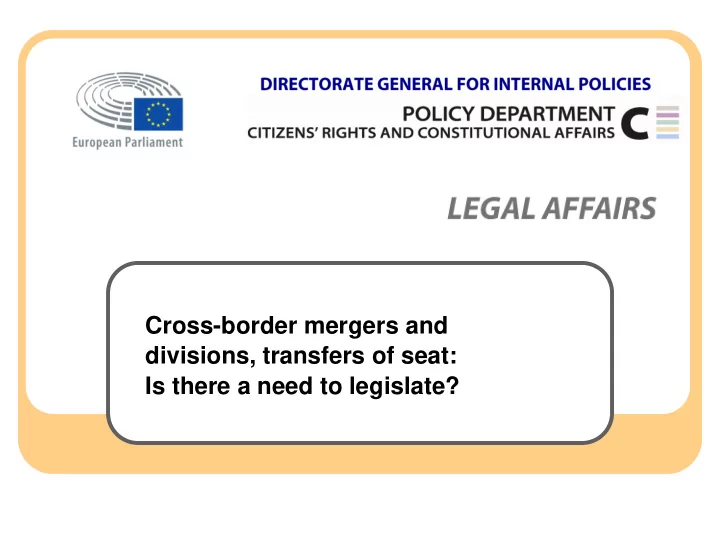

Cross-border mergers and divisions, transfers of seat: Is there a need to legislate?
Outline 1. The Status quo 2. Cross-border mergers 3. Cross-border divisions 4. Cross-border transfers of seat (conversions) 5. Legislative implementation
1. The Status quo cross-border cross-border cross-border Type of company transfers of seat mergers divisions (conversions) limited liability Cross-border Mergers Directive (CBMD) companies freedom freedom UCITS UCITS Directive of establishment, of establishment, Articles 49, 54 TFEU Articles 49, 54 TFEU ( argumentum e ( Cartesio, VALE ) freedom other legal entities Sevic, Cartesio, VALE ) of establishment, within the meaning Articles 49, 54 TFEU of Article 54 TFEU ( Sevic ) formation of an SE/SCE: Art. 8 SE-Regulation/ SE/SCE - SE/SCE-Regulation Art. 7 SCE-Regulation
2. Cross-border mergers 2.1. Achievements of the CBMD • harmonised legal framework provides legal security and reduces transaction costs • increasing number of cross-border mergers But: problems and difficulties remain
2. Cross-border mergers 2.2. Recommendations for a revision of the CBMD • extension of the scope to all legal entities within the meaning of Art. 54 TFEU • further harmonisation of the rules on creditor protection ( ex post protection system) • harmonisation of minority shareholder protection (exit right against adequate compensation and right to get additional compensation in case of an inadequate exchange ratio) • certain exemptions from the requirement of a merger report
2. Cross-border mergers 2.2. Recommendations for a revision (continued) • harmonisation of the rules on the accounting date and on valuation • standard forms for the relevant documentation and communication and in particular also the pre-merger certificate; in addition, possibly also a single language requirement • due to the political sensitivity of the issue of employee protection, this area should be omitted from any short-term revision (and reserved for a general review of the employee protection regimes in the various EU legal acts).
3. Cross-border divisions 3.1. The need for an EU legal framework • enable legal entities to effectively exercise their ‘freedom to divide’ • sound economic reasons: cross-border divisions are an attractive tool for cross-border reorganisations • crucial advantage of divisions: (partial) universal transfer of all assets and liabilities uno acto • risks for stakeholders can be tackled by implementing an appropriate legal framework
3. Cross-border divisions 3.2. Key features of an EU directive on cross-border divisions • general principle: correspondence with rules on cross-border mergers • scope: all legal entities within the meaning of Art. 54 TFEU
3. Cross-border divisions split-up types of divisions covered spin-off hive-down
4. Cross-border transfers of seat (conversions) 4.1. The need for an EU legal framework • enable legal entities to effectively exercise their ‘freedom to convert’ • economic argument: cross-border conversions are an attractive tool for cross-border reorganisations • other options currently available to ‘move’ the registered office to another Member State (re-incorporation, CBMD, SE/SCE) are in fact not really equivalent alternatives • EU legislative framework imperative to create a level playing field and to establish clear and harmonised standards with respect to the protection of minority shareholders, creditors and employees
4. Cross-border transfers of seat (conversions) 4.2. Key features of an EU directive on cross-border transfers of seat (conversions) • identity-preserving conversion • scope: all legal entities within the meaning of Art. 54 TFEU • ‘transfer of seat’ = transfer of the registered office • no requirement to transfer also the head office • conversion procedure based on ‘European model for structural changes’ (like in the CBMD) • protection rules of creditors, minority shareholders and employees • tax neutrality
5. Legislative implementation and: harmonisation of the rules on the law applicable to companies
Presentation by Prof. Dr. Jessica Schmidt, LL.M. Chair for civil law, German, European and international company and capital markets law University of Bayreuth Policy Department Citizens’ Rights and Constitutional Affairs Responsible Administrator: Udo BUX poldep-citizens@ep.europa.eu
Recommend
More recommend